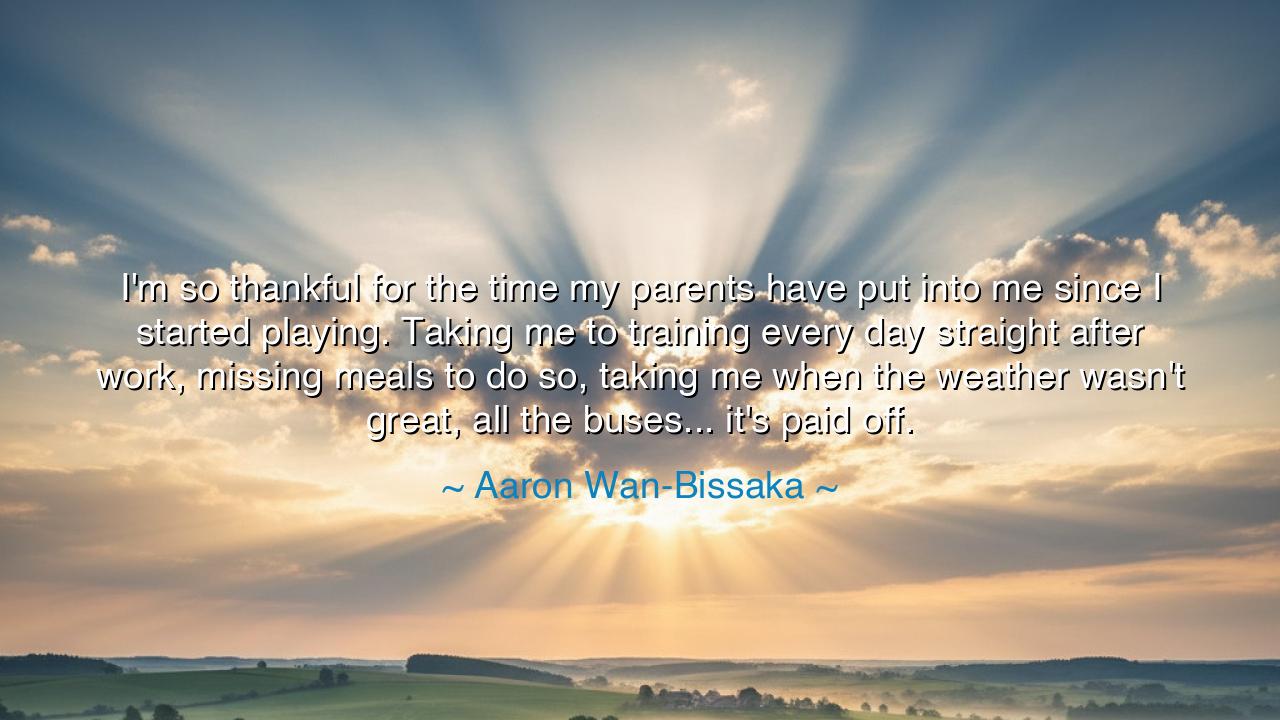
I'm so thankful for the time my parents have put into me since I
I'm so thankful for the time my parents have put into me since I started playing. Taking me to training every day straight after work, missing meals to do so, taking me when the weather wasn't great, all the buses... it's paid off.






Aaron Wan-Bissaka once spoke with the heart of a son and the humility of a servant of destiny: “I’m so thankful for the time my parents have put into me since I started playing. Taking me to training every day straight after work, missing meals to do so, taking me when the weather wasn’t great, all the buses… it’s paid off.” In these words lies more than gratitude—it is a hymn to sacrifice, to love, and to the unseen labor that shapes greatness. For behind every warrior, every champion, every victor, there stands the silent strength of those who bore the burdens so their child might rise.
The ancients revered this truth. In every tale of the hero, there is always mention of the mother or father who nourished the spirit before glory arrived. Achilles had Thetis, who bathed him in the river and armed him for battle. Alexander had Philip, who taught him strength, and Olympias, who told him he was destined for greatness. But unlike the celebrated crowns of kings, the toil of parents is often hidden—like roots beneath the earth, unseen yet feeding the towering tree. Wan-Bissaka’s thankfulness uncovers this truth, reminding us that parental love is the first foundation of triumph.
Consider the long journeys his words describe: weary parents, still clothed in the dust of work, carrying him to the field, enduring the cold winds, waiting through the hours of training. These sacrifices are the silent victories before the public ones. History offers parallels—such as Thomas Edison’s mother, who, when teachers dismissed her son as incapable, taught him herself and encouraged his relentless curiosity. Edison’s brilliance, like Wan-Bissaka’s skill, was lit by a parent’s quiet fire. Without such devotion, genius might remain dormant, and talent might never bloom.
What strikes deepest in Wan-Bissaka’s confession is the image of meals missed, of weather endured, of countless buses taken. These are not the grand sacrifices sung by poets, but the ordinary ones repeated daily, which demand even greater strength. The father who goes hungry so his son might eat, the mother who braves storms to ensure her daughter’s lesson is not missed—such sacrifices are the true poetry of love. It is these that Wan-Bissaka remembers, and it is these that have “paid off,” for the fruits of such sacrifice are found not merely in success, but in the deep gratitude it plants in the heart of the child.
The meaning, then, is that no triumph is solitary. Every medal, every cheer, every victory is shared with those who carried the weight in silence. A son’s greatness is the crown of his parents’ labor; a daughter’s achievement is the flowering of her family’s sacrifice. To be thankful, as Wan-Bissaka is, is to recognize this eternal truth—that we are never self-made, but always the children of devotion.
The lesson is clear. To the young: never forget those who bore hardship so that you might thrive. Speak your gratitude aloud, for unspoken thanks is a seed that withers. To parents: know that every sacrifice, no matter how small, weaves into the destiny of your child. And to all: remember that greatness is not only in shining moments but in hidden acts of love that shape the road long before the destination is reached.
Practical counsel may be taken. Express gratitude daily to those who support you. Honor the unseen sacrifices by living with diligence, integrity, and humility. Strive not only for your own glory but for the fulfillment of the love that has carried you this far. And in time, when you are able, return the same devotion to others—be it your children, your community, or those who walk beside you in struggle.
Thus, Wan-Bissaka’s words are not only the testimony of an athlete but a teaching for all: be thankful, honor the sacrifices, remember the journeys, cherish the silent love that carried you through storms. For in this gratitude lies not only humility, but the strength to carry forward the same spirit of sacrifice, ensuring that love and devotion never end, but are passed like a torch through the generations.






AAdministratorAdministrator
Welcome, honored guests. Please leave a comment, we will respond soon